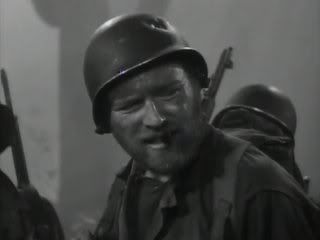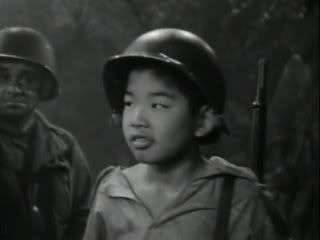You guys have a bad habit of starting something you can't finish.


Tonight TCM is marking the 60th anniversary of the start of the Korean War (which officially began on June 25, 1950) by kicking off a 24-hour block of films set (and in some cases made) during that conflict. Naturally, one of the films on the schedule is 1951's The Steel Helmet, which was the first film about the war to make it to the screen, but TCM isn't airing it until 11 p.m., which is a bit late for me, so I got the DVD out of the library to watch at a more reasonable hour.
Written, produced and directed by Samuel Fuller, who based some events on his own combat experience in World War II, The Steel Helmet stars Gene Evans as a gruff, unsentimental sergeant who is the sole survivor from his unit after it is ambushed. Having miraculously escaped certain death, he reluctantly gains a mascot in the form of an orphaned South Korean kid he nicknames Short Round (William Chun, paving the way for Jonathan Ke Quan three decades later) and they hook up with a black medic (James Edwards) in a similar situation before meeting a patrol that's been tasked with setting up an observation post at a Buddhist temple. Evans immediately clashes with the lieutenant in charge (Steve Brodie), but agrees to help them reach their objective in exchange for a box of cigars one of the soldiers has on them. Not exactly the model soldier, but he knows what he's doing and he gets the job done.
The film is bracketed by title cards declaring that it is "Dedicated to the United States Infantry," which Fuller had served in throughout World War II, and that "There is no end to this story," which was true enough at the time since the conflict in Korea was still years away from its provisional cease-fire. As for the part in between, if anybody knew how to tell a war story from the grunt's point of view, it was Fuller, and in Evans he found the perfect grunt -- one who could quickly size his fellow soldiers up, convincingly bark orders at them and expect them to be followed. In fact, the only one he really respects is fellow sergeant Richard Loo, a Japanese-American (and fellow World War II vet) who goes by the nickname "Buddha-Head" and doesn't seem to mind it. At least that's better than the conscientious objector (Robert Hutton) who has to put up with being called "Conchie."